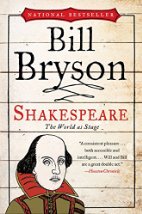The argument over
the author of Shakespeare’s plays – and even his existence – rely on a rather
silly and unsupported raft of ideas, which easily sink on close
examination. The documents mentioning
Shakespeare are legion, yet not a single document directly connecting another
author to the plays exists. Many of the
candidates died before Shakespeare, and plays those candidates supposedly
penned, contained events of ideas which occurred after their death. Bill Bryson has authored an entertaining and
carefully supported review of what we do know about the Bard of Avon. His 2007 national bestseller, Shakespeare: The World as Stage, should
be of interest to anyone even remotely curious about the greatest writer in the
English language.
Bill Bryson has
written a number of non-fiction works, which have occupied the best seller
lists for some time. He was born in Des Moines,
Iowa, but now lives in Norfolk, England. His smooth and entertaining style is
accessible to anyone with even the slightest idea of Shakespeare from high
school English classes. Bryson also
provides vivid pictures of Elizabethan England.
He writes of London, “City life had a density and coziness that we can scarcely
imagine now. Aware from the few main
thoroughfares, streets were much narrower than they are now, and houses, with
their projecting upper floors, often all but touched. So neighbors were close indeed, and all the
stench and effluvia that they produced tended to accumulate and linger. Refuse was a perennial problem. […] Rich and
poor lived far more side by side than now.
The playwright Robert Greene died in wretched squalor in a tenement in
Dowgate, near London Bridge, only a few doors from the home of Sir Francis
Drake, one of the wealthiest men in the land” (49). Bryson continues, “According to nearly all
histories, the gates to the city were locked at dusk, and no one was allowed in
or out till dawn. though as dusk falls at midafternoon in a London winter there
must have been some discretion in the law’s application or there would have
been, at the very least, crowds of stranded, and presumably aggrieved, play
goers on most days of the week” (49-50).
The book also
contains a number of interesting tidbits about the times. Of particular interest to me is the state of
publishing and book binding. Bryson
writes, “Printed books had already existed, as luxuries, for a century, but
this was the age in which they first became accessible to anyone with a little
spare income. At last average people
could acquire learning and sophistication on demand. More than 7,000 ttiles were published during
Elizabeth’s reign – a bounty of raw materials waiting to be absorbed, reworked,
or otherwise exploited by a generation of playwrights experimenting with new
ways of entertaining the public. This is
the world into which Shakespeare strode, primed and gifted” (52). So much for the naysayers idea that a country
boy, who did not have a college degree, could have written so many memorable
and magnificent works.
In 1668, John Dryden
wrote of Shakespeare, “Those who accuse him to have wanted learning, give him the
greater commendation: he was naturally learn’d” (109)
Bill Bryson’s entertaining
and enlightening book, Shakespeare: The World
as Stage also has an extensive bibliography for further reading. I would also recommend Stephen Greenblatt’s Will in the World for a further and more
detailed exploration of Shakespeare’s life. 5 stars


No comments:
Post a Comment